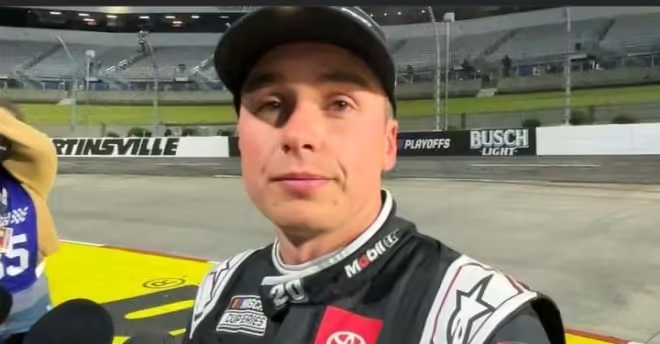
Christopher Bell found himself at a crossroads of frustration and disbelief after receiving a “safety violation” following NASCAR’s Martinsville race, which ultimately removed him from contention for the Championship 4. Bell, who has shown consistent skill and resilience throughout the season, was hoping to secure his place in NASCAR’s most prestigious finale. However, the ruling and its timing left him shocked, challenging both his morale and the broader perception of NASCAR’s judgment on safety and performance infractions.
The safety violation reportedly stemmed from an issue with Bell’s car that NASCAR officials deemed critical enough to warrant the penalty. Though NASCAR has stringent standards in place to ensure all vehicles meet safety regulations, this particular penalty seemed to take Bell by surprise. In post-race interviews, his frustration was palpable; he struggled to find words to express his disbelief. Bell’s speechlessness wasn’t just about the impact on his championship hopes but also about the seemingly harsh and, in his view, untimely nature of the penalty.
For NASCAR, safety violations are a top priority. Any discrepancy that could compromise the safety of drivers, crews, or fans is treated with seriousness. However, Bell and his team likely felt that the specific issue flagged during this incident was either misjudged or that NASCAR’s timing lacked consistency. This has been a common grievance among drivers who feel the organization’s regulations can sometimes be too stringent, especially in high-stakes races where even a minor call can have outsized consequences.
The Martinsville race, often known for its tight turns and high levels of contact between cars, was intense as usual, with drivers jockeying for the best possible positions leading into the Championship 4. Bell had navigated the challenges well and was positioned to advance, making the timing of the violation even harder for him and his team to accept. The penalty nullified his efforts, leaving him and his team to question how a season’s worth of hard work could be derailed by a post-race call.
Bell’s reaction also reflects a broader sentiment among NASCAR drivers regarding the clarity and application of rules. Many drivers and fans alike see inconsistencies in how penalties are assigned, especially when the stakes are as high as they are in the final races of the season. For Bell, the penalty underscored a long-standing debate within NASCAR about how to strike a balance between enforcing safety regulations and preserving the competitive spirit of the sport.
Despite the setback, Bell’s response was measured but emotional. He refrained from criticizing NASCAR directly, but his frustration was evident. Fans and analysts speculated whether this incident would lead to a push for more transparency in NASCAR’s ruling processes, particularly when it comes to ambiguous or last-minute penalties. This event added to an ongoing conversation about how the organization could improve its communication with teams to avoid unexpected outcomes that diminish drivers’ opportunities.
For Bell, missing the Championship 4 is undoubtedly a bitter pill to swallow. However, his resilience and performance this season have already cemented him as a formidable competitor. Whether or not NASCAR revisits its safety protocols or the manner in which penalties are applied remains to be seen, but Bell’s experience at Martinsville will surely resonate as a reminder of the thin line between caution and competition in the fast-paced world of NASCAR.